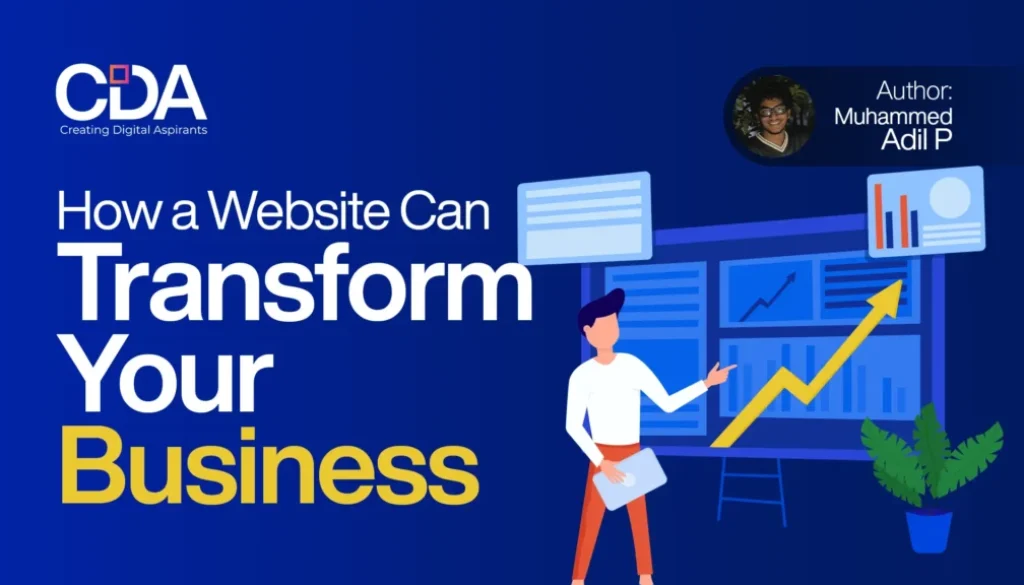How a Website Can Transform Your Business
In today’s digital world, having a website is crucial for businesses of all sizes. Whether you run a local shop, a small business, a startup, or an e-commerce enterprise, having an online presence can make a significant difference. This article will explore how a website can transform your business by addressing crucial questions potential customers may have.
Table of Contents

The Importance of Having an Online Presence
- Establishing Credibility
Having a professional website makes your business look credible and trustworthy. In an era where consumers often turn to the internet to find products and services, a well-designed website assures potential customers that your business is legitimate. Consider it your digital storefront. Imagine walking past two stores—one with a polished display and another with a shabby look. Which one would you trust more? A website works similarly by making your business look professional.
- Reaching a Wider Audience
A physical store limits your reach to people in a specific geographic area, but a website opens your business to the world. With an online presence, you can attract customers from different cities, states, and even countries. For instance, a local handmade crafts store in Calicut could sell its unique products not just within Kerala but across India and even globally.
- Staying Competitive in the Market
Every modern business worth its salt has a website. If your competitors are online and you’re not, you’re already trailing behind. With a website, you can stay competitive by showcasing your products, services, and unique value propositions. This allows you to compete on a level playing field with businesses that might be bigger or more established.
Enhancing Customer Engagement
- Interactive Features
A website allows you to engage with your customers more effectively through various interactive features like chatbots, comment sections, and forums. These features help you understand customer needs and preferences better. For example, a chatbot can guide users through common queries, improving their overall experience and saving time for both parties.
- Personalized User Experience
Through data analytics, you can track user behavior on your website to offer a more personalized experience. For instance, if a user frequently checks out fitness equipment on your site, you can recommend similar products, offer special deals, or provide useful content related to fitness. Personalized experiences make customers feel valued, increasing the likelihood of repeat visits.
- Efficient Customer Support
A well-structured website can enhance your customer support significantly. Features like FAQs, live chat, and contact forms allow customers to get help instantly. By providing solutions to their problems quickly and efficiently, you enhance customer satisfaction and build a loyal customer base. This way, even small businesses can offer efficient customer support similar to larger enterprises.
Boosting Sales and Revenue
- Online Stores and E-commerce
The rise of e-commerce has made it vital for businesses to sell products online. A website can act as an online store, enabling you to sell products 24/7. This means you can generate sales even when your physical store is closed. For example, a clothing boutique in Calicut can offer its seasonal collections online, attracting customers who prefer shopping from the comfort of their homes.
- Conversion Rate Optimization
A website allows you to apply strategies that can boost your conversion rates. Tools like A/B testing, where you present two versions of a webpage to see which performs better, can provide valuable insights. By making data-driven adjustments to your layout, calls-to-action, and content, you can significantly improve the percentage of visitors turning into actual customers.
- Digital Marketing Strategies
With a website, you can leverage various digital marketing strategies such as pay-per-click (PPC) advertising, email marketing, and social media campaigns to drive traffic and boost sales. For instance, you can run targeted Google Ad campaigns to attract specific customer demographics interested in your products or services.
Improving Brand Visibility and Awareness
- Search Engine Optimization (SEO)
SEO is a long-term strategy that aims to increase your visibility in search engine results. By using specific keywords relevant to your business, optimizing meta descriptions, and building quality backlinks, you can improve your website’s ranking. For example, a digital marketer in Calicut might use keywords like “best SEO services in Kerala” to attract local businesses seeking SEO help.
- Social Media Integration
Integrating your website with social media platforms can significantly enhance your brand’s visibility. Social sharing buttons, embedded feeds, and social login options make it easy for visitors to connect with you on various social platforms. This not only drives traffic to your site but also boosts engagement, making your brand more visible.
- Content Marketing
Creating valuable and relevant content can attract and engage your target audience. Blog posts, podcasts, and videos can position you as an authority in your industry, improving your brand awareness. For example, a real estate agency might produce a blog post titled “Top 5 Real Estate Trends in Calicut,” attracting local customers searching for property-related information
.
Streamlining Business Operations
- Automation and Efficiency
A website can automate several business operations, streamlining processes and increasing efficiency. For instance, automated billing systems, appointment bookings, and email responses can save you time and resources. This allows you to focus on more critical aspects of your business, such as strategy and growth.
- Customer Relationship Management (CRM) Systems
CRM systems integrated with your website can help you manage customer relationships more effectively. These systems store customer information, track interactions, and analyze data to offer insights. This way, you can personalize your marketing efforts and improve customer satisfaction.
- Analytics and Data Management
A website provides valuable data on user behavior, traffic sources, and conversion rates. Tools like Google Analytics can help you understand how visitors interact with your site, which pages are most popular, and where improvements are needed. This information enables you to make informed business decisions and optimize your strategies for better results.
Building Long-term Customer Relationships
- Loyalty Programs
Loyalty programs are effective in retaining customers. By offering rewards, discounts, or exclusive deals to repeat customers, you can encourage them to keep coming back. For instance, an online bookstore could offer a loyalty program where customers earn points for every purchase, which they can redeem for discounts on future purchases.
- Regular Updates and Communication
Keeping your customers informed through regular updates, newsletters, and blog posts can build long-term relationships. Informing them about new products, special offers, and upcoming events keeps them engaged and fosters a sense of community. This way, customers feel valued and are more likely to remain loyal.
- Building an Online Community
An online community can provide a platform for customers to share their experiences, provide feedback, and engage with each other. Forums, social media groups, and community sections on your website can create a sense of belonging, fostering long-term relationships. This is beneficial for both customers and your business, as it builds trust and loyalty.

Conclusion
Having a website is crucial for transforming your business in today’s digital age. From establishing credibility and reaching a wider audience to enhancing customer engagement and boosting sales, a website offers numerous benefits. If you’re ready to take your business to the next level



